- Home
- Laura Anne Gilman
Tricks of the Trade Page 16
Tricks of the Trade Read online
Page 16
I don’t know why I’d expected more from Pietr—smart guys were still guys, sometimes.
“All right, that’s being dealt with. Where do we stand on the break-in?” Venec asked, turning his attention to those of us left in the room. I hrrmmmmed and errrred a bit, not having any idea. Thankfully, Nick and Sharon—whose case it had been, originally—had more clue.
“We finally got a report of what was missing,” Nick said, and from his expression I was guessing that “we” meant “him.” “And confirmed what the owner claimed, that for all the damage that was done, there were only two objects taken—a silver pocket watch, ordinary, and a glass dagger, which looked like an ordinary paperweight, but was actually a memory-glass.”
A memory-glass was a Talent-trinket. Nulls get to use digital frames and downloads, we store images and voices a different way. They were low-res, incredibly basic so anyone could use it, even Nulls, and it probably wasn’t all that surprising that the client—who had fallen for the “magical defense” line—had one. It was odd that anyone had stolen it, though. They’re not lockable, so odds were he hadn’t hidden any blackmailable memories in there, even assuming he trusted a Talent enough to share it in the first place, for storing….
But they were taken, so that had to mean something.
“What was stored in the glass?” Venec asked, probably matching my thoughts exactly.
Sharon picked up the narrative. “Nothing sensitive according to the client. Some memories that he didn’t want to forget, family trips, things about his wife, that sort of whatnot. Sentimental value, nothing more. Ditto the watch. Pretty, but not particularly valuable or unique. He didn’t even have photos taken for insurance purposes, never saw the need, which for this guy means he really didn’t think it was valuable—he had photo, acquisition cost and market value on every other thing that was broken.
“Client is convinced that someone stole them in order to put a hex on him, and before you ask, yeah, he’s got the usual string of ‘nice guy, fair businessman’ testimonials that could have come from a playbook, they’re so generic. If he has enemies they’re playing it cool.”
She paused. “I couldn’t tell if he was lying or not, but I’m pretty sure he was telling the truth that they were only sentimental memories, not anything worth stealing. And since he wasn’t the one who installed the memories…I’m not sure anyone could actually use it for a hex, at least not on him. Could they?”
Lou shook her head. “The only thing to latch onto would be the signature of the Talent who made it. Anyway, anyone who could do this wouldn’t bother with a hex, if they wanted to hurt the guy. There are more direct, more impressive ways to do damage.”
Venec frowned, leaning forward again. “Wife’s dead?”
Nick picked up this time. “Cancer. Kid disappeared soon after, packed a bag and gone. Cops investigated—husband filed a missing persons report—kid had run away before. There were no known enemies, no domestic complaints, so… Guy’s had a crap life, for all the money—wife’s dead, kid gone a year later, I guess it makes sense he’ll pull out all the stops, even magic, to reclaim stuff that holds good memories, even without fear of a hex.”
Venec had a look on his face I couldn’t quite decipher. The temptation nibbled, to lower my walls and see if I could read his emotions, but I didn’t. Wasn’t kosher, and, anyway, if I did that he’d be able to read me even easier, and that wasn’t kosher, either.
“What was this guy’s name again?”
“Wells.”
“Huh. Okay, no.” Whatever it was that niggled him, he wasn’t sharing. “So we have a guy whose very nice little mansion was ransacked and trashed—”
“Portions of it were trashed,” Sharon clarified. “Only the two rooms downstairs, the office and the…call it a library, I guess. Nothing upstairs, the kitchen and front parlor were left alone.”
“Right, two rooms taken apart. Specifically, the two rooms where someone might store something valuable, either physical or electronics, not just current-based memory-keepers. Magical thieves do not mean only a magical theft, people.”
I hadn’t even thought about that, and from the lack of notes, neither had Sharon or Nick. Damn it, that was sloppy. The client was a Null, so we should have thought about digital records. We weren’t allowed blind spots like that.
Venec didn’t stop for us to beat ourselves up. “So our violence-prone intruder was possibly looking for something specific, either business or personal, but all they took were trinkets? And our client has no known enemies, no business rivals, nobody who’d get a thrill out of seeing him get taken down a few notches?”
“Seven names on the list,” Lou said, touching the pad of paper in front of her. “Three of them are totally Null, so it’s almost improbable they’d have been able to hire anyone from within the fatae community.”
It was a weird tick to Nulls—the more current-blind they were, the more they managed to float through life without even a glancing interaction with the Cosa Nostradamus, at least within a magical range of interaction. Not only were they not going to hire supernaturals, they wouldn’t hire anyone who would then hire supernaturals. J said there was some kind of physics explanation to it, but I’d never cared enough to look it up.
I pulled out my own pad and made a note to myself: it was time to do some reading about that. If that Null aversion field was a way to eliminate suspects, we needed to know. While I had the pad out, I wrote “electronic files as motive” and underlined it. Twice. Next time, we wouldn’t forget to consider it.
“I was hoping that one of the rivals would turn out to be useful,” Nick said. “Rumor was he’d had an affair with the dead wife, years ago, and blamed our client when the kid went missing, but the guy, Isaacs, came up clean, and—”
“What?”
Venec’s voice didn’t rise, and his body didn’t move—in fact, if anything, his tone dropped and he went incredibly still, exactly like the air before a tornado hit.
“Ah, he came up clean?”
“The name.”
“Isaacs. Jerry Isaacs.”
Venec moved then, his hand snatching out to grab the file from in front of poor Nick. “Damn it.”
That simple, heartfelt swearword was more chilling than any invective he might have unleashed, because it brought a storm I hadn’t felt coming, slamming against my walls in a wave of emotion I was pretty sure he hadn’t meant to unleash.
Anger. Annoyance. And…guilt. Overwhelming, agonizing guilt. The hell?
“Boss?” Lou had picked up something, too, while Nick was flicking his gaze from the file in Venec’s hand, up to his face, then back again.
The wave of emotions stopped, his wall slamming back up, and I discovered that my heart was pounding and my body was wobbly, like I’d just dashed up all seven flights of stairs in record time, during a fire alarm.
When Venec spoke again, it was as though nothing had ever harshed his calm. “An interesting development. Possibly of importance, possibly merely coincidence.” He paused to consider his words. “Or possibly not coincidence, but inevitability.”
Whatever he was about to say, I didn’t think we were going to like it.
“I was employed, years ago, by the now-dead wife.
Christine.”
Before PUPI, Venec had been a PUI on his own, that was why he taught us, handled the day-to-day stuff. But he’d been based down in Atlanta, or somewhere, not New York. So how…
Venec’s voice was low and soft, like he was talking to himself. “Christine was referred to me. Her son had gone missing while he was in college, down my way. She wanted me to find him. That was my specialization, finding people who had jumped the track. Usually people who had skipped out on a bond, but runaways, too. She had used that guy’s name, though. Isaacs. That’s why I didn’t recognize this…and Isaacs, he had come with her, I thought he was her husband.”
Okay, the boring break-in case had suddenly gotten a hell of a lot more interesting. I didn’t
think that was a good thing.
From the feeling I got off Venec, neither did he.
Venec left them to rechecking their information with a focus on Isaacs—in their business you couldn’t discount someone just because he was dead—and headed for the garage on the East Side where he kept his bike. It was a fast ride uptown from there, up the Henry Hudson and into the Bronx, and the private community of Fieldston. The house looked the same as Ben remembered it. It had been full summer, then, with everything in bloom, under a lazy heat that had felt cool to him, having flown out of the Atlanta airport that morning. He had been there to examine the boy’s room personally and see if there was any clue the parents and the cops had missed.
There hadn’t been. The room had been utterly, completely normal, for the only child of a well-off family. Ben had wondered, then, if he’d missed anything important. He knew he had, now. He just didn’t know what.
Dismissing old memories, he drove past the house, not even bothering to look for parking on the street; in this neighborhood, that was a good way to get a ticket for not having a resident sticker. His bike took the corner easily, down the street and out of the elite neighborhood, to the more blue-collar areas where a motorcycle parked on the street wouldn’t raise an eyebrow from anyone, or gather notice from an overzealous private security force.
He left his helmet with the bike, running his hands through his hair to smooth it out, and tugged at his hip-length leather coat to make sure it was hanging properly. He might not be as appearance-savvy as Ian, but he knew the importance of looking the part.
He walked back, observing the neighborhood from foot. A wide range of house styles, but they all had the same thing in common: distance from the street, and from each other. Privacy was important to these people…and that meant there wasn’t going to be anyone to confirm or deny the owner’s report other than his own staff, who couldn’t be trusted.
He didn’t fault Sharon or Nick for not second-guessing Wells. They were sharp, but they still had an innate hope that humans would do the right thing. Even Sharon, with her truth-sense, still had hope.
He wasn’t going to beat that out of them. Life would do it soon enough. Life, and this job.
He had found the son a few weeks after his visit, living in a group house in New Orleans. He’d told the boy his mother was looking for him, asked for permission to give her his current address. The boy had resisted, at first, but the longing and loneliness had won out. The boy had been maybe fifteen; healthy and clean. Whatever else might have been going on in that house, he’d loved his mother a great deal, and she had loved him.
The boy had gone back home. According to the dossier Nick and Lou put together, the mother, Christine, died about a year later. A sudden, fast-moving cancer. There was no mention of what had happened to the boy. Probably he had hit the road again, this time for good. If his mother was using another man’s name when she searched for him, odds were there wasn’t much love between the father and anyone else in the house.
According to the report, Wells had taken residence in his summer home, up in the Catskills, while the repairs to the damaged rooms were being made. The housekeeper remained, to oversee things. He had never met the housekeeper on that first visit, if she was even the same woman, so he wasn’t worried about any awkward questions. So far as they knew, he would merely be the supervising investigator, coming out to check on his employees’ work.
Assuming the housekeeper saw him at all. He was going to try to avoid that.
There was a gate at the base of the driveway, but nothing surrounding the lawn itself save low shrubbery. He frowned, trying to remember if the gate had been there back then.
It hadn’t.
So. Something new the grieving father had installed? Or an insurance requirement? Ben touched the metal briefly with one finger, letting himself reach for anything, electrical or magical, that might be waiting within.
Nothing. For all of Wells’s talk of deterrence and alarms, the gates weren’t electrified or current-reinforced. They were simply for show? Odd, but not impossible. People with money did strange things.
He walked past the metal gateposts, moving up the driveway toward the house, when he first heard the noise. A low rumbling, as though someone had started up a lawn mower somewhere, or revved an ancient engine, rough and ragged.
He was halfway up to the house when the sound came again, this time more clearly. Not metallic but organic, wet and angry. And coming closer.
He barely had time to mutter “oh, fuck” before the hellhound was on him.
I’d started to work on restructuring the diorama one more time, after Sharon pointed out—logically, as Sharon was prone to—that we might need it if the guys didn’t get a confession from the suspects. I thought she was way overestimating what the diorama might be capable of, but then, we didn’t know until we tried, did we?
I knew why I’d resisted: given a choice, I’d rather have been doing almost anything else—setting the base in place again was screwing around with my nerves. The room was still overshielded, so even if the diorama-spell snapped, odds were that I’d be protected from the worst of the blast, but reworking a spell was a tricky thing. Reworking it in the exact same place, using the exact same patterns, meant I was building up even more energy than before, which meant that if anything went wrong, it could snap even harder.
I could smell my own sweat, and the underlay of the lemon-scented cleanser we used on the floor and furniture, and felt my legs cramp from tension, and the pushpins of a headache starting at the back of my skull. Pressure, inside and out.
I suddenly understood why witches and mages in the Old Time went crazy, trying to pull too much magic without understanding it was their own body they were using as the conductor, not knowing how important it was to modulate it, control it. We call that wizzing now, when your body just gets overwhelmed by the pure power you were using, and…
And it didn’t do anyone any good to think about it. Control was how you kept control, and the moment you started to doubt, control cracked.
Like Venec, and the Merge. If I let down my guard…
And with that thought, my control totally went out the window, and the structure shattered into annoying sparks and sparkles.
“Damn it…” Even nowhere in sight, the man was a distraction.
“This isn’t going to work,” I said, trying to dislodge the sense of failure that was dogging me. “I’m overthinking, second-guessing what I saw. Anything I build now is going to be contaminated.” Probably. It had been too long, anyway, and there was too much else in my head—not to mention too many people in the room. I worked better alone.
Giving up, I let the base disperse, taking back the current into my core, and turned to look more carefully at the other construct at the other end of the table. Sharon, ignoring my outburst, was still building her own diorama, holding it steady with control that was worth admiring. Nick was watching, adding in a comment or suggestion every now and again in a low voice. Theirs wasn’t as detailed as mine; her gleaning skills and memory weren’t as strong, yeah, but also a house was more detailed and complicated than the concrete pier, so there were, inevitably, blank spots.
“Nick tried to fill in the details with what he saw,” Sharon said, looking up and seeing where my gaze had lingered. “But we couldn’t get his gleaning and mine to merge.”
The word sent a shiver down my back, but I didn’t think any of the others noticed. Or if they did, they didn’t say anything. Why would they? The word didn’t mean anything to them other than the dictionary definition.
“We’ll figure that out, eventually,” Nick said with confidence. I wasn’t so sure. As a group, we could do it, but not every Talent could work together one-on one, even when they were friends or relatives. Current sometimes sparked like that. Yeah, we’d done well as a team before, when we tried to glean the emotional evidence from the murder scene in the Reybourne case, and again when we’d seen the confrontation with the ki-rin
through Stosser’s awareness, but those times had been under Venec’s control, his lead. We gave up control to him. Sharing, one-to-one, the way that would be required to build something together, rather than follow in a predetermined route? That was a lot more delicate.
I studied the finished diorama, letting my eyes take in details without actively looking for anything, while my mind chased after that thought. Pietr and I could slip in and out of each other’s current-bubble—we’d done it before, to show each other things through mage-sight. But I’d never had to do it with any of the others, didn’t know if I would trust them that much, to let them slide into my core, without feeling the need to control the intrusion, trust them not to look, instinctively, where they hadn’t been invited.
That might be the next exercise for Venec to run us through, when we had some downtime.
Oddly, that thought didn’t give me any flutter of panic, and yet the idea that Venec might be able to do that, slip under my walls at will… Totally different thing.
“These were the only rooms that were disturbed, that we know about. The client didn’t let us wander around, so although I think we saw everything, I can’t swear to it.” Sharon sounded annoyed about that. Considering that Pietr was able to disappear from most peoples’ awareness, it would have been a simple matter for him to go anywhere he wanted, if he had been assigned the initial survey of the scene…except it was mainly a defensive reaction, brought about by stress or fear rather than direct control. I was sort of surprised that the Big Dogs hadn’t been working with him on that; but then again, maybe they had, and nobody mentioned it to me. No reason they would, after all.
My ego took the hit with reasonable grace and a little relief—I didn’t have to know everything, even if I sometimes wanted to—and I leaned in to look more closely at their diorama. It was the first time I’d seen Sharon’s work, and while the detail wasn’t as precise as mine, it was still solidly built. That was harder than it sounded—I was pretty sure neither Nick nor Nifty could have done it as well. Pietr, maybe.

 West Winds' Fool and Other Stories of the Devil's West
West Winds' Fool and Other Stories of the Devil's West Gabriel's Road
Gabriel's Road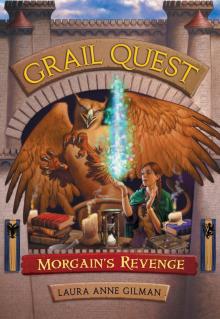 Morgain's Revenge
Morgain's Revenge The Shattered Vine
The Shattered Vine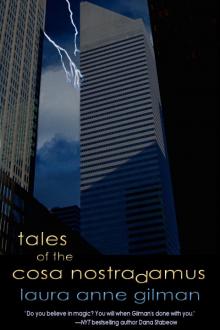 Laura Anne Gilman - Tales of the Cosa Nostradamus
Laura Anne Gilman - Tales of the Cosa Nostradamus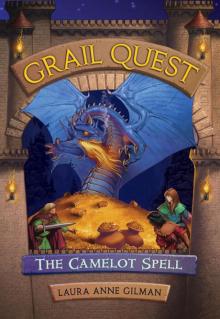 The Camelot Spell
The Camelot Spell VISITORS
VISITORS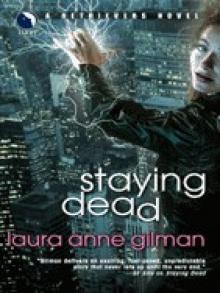 Staying Dead
Staying Dead Silver on the Road
Silver on the Road Weight of Stone
Weight of Stone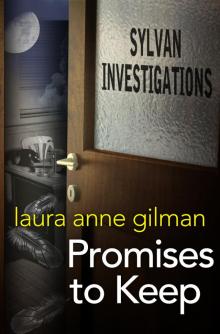 Promises to Keep
Promises to Keep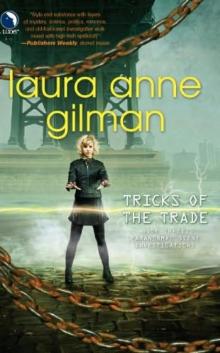 Tricks of the Trade psi-3
Tricks of the Trade psi-3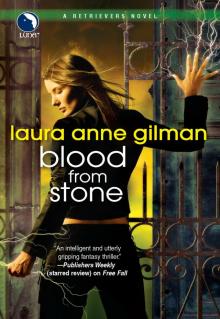 Blood from Stone
Blood from Stone Soul of Fire tp-2
Soul of Fire tp-2![Pack of Lies [2] Read online](http://i1.bookreadfree.com/i1/04/01/pack_of_lies_2_preview.jpg) Pack of Lies [2]
Pack of Lies [2] Burning Bridges
Burning Bridges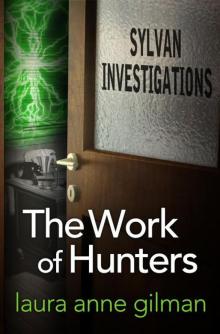 The Work of Hunters
The Work of Hunters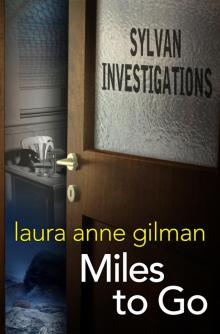 Miles to Go
Miles to Go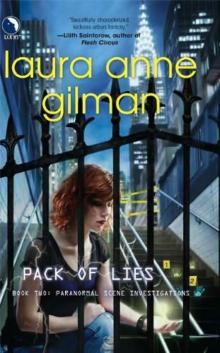 Pack of Lies psi-2
Pack of Lies psi-2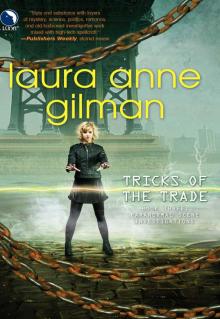 Tricks of the Trade
Tricks of the Trade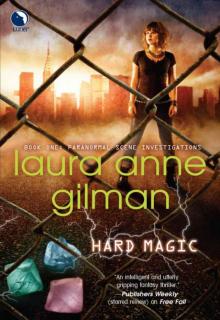 Hard Magic
Hard Magic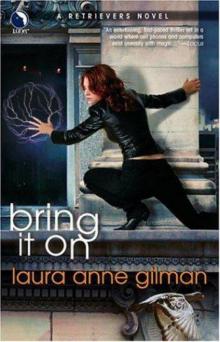 Bring It On
Bring It On Darkly Human
Darkly Human The Cold Eye
The Cold Eye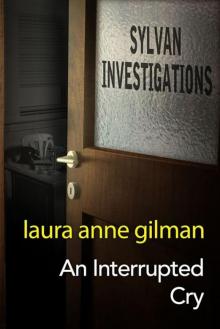 An Interrupted Cry
An Interrupted Cry Soul of Fire
Soul of Fire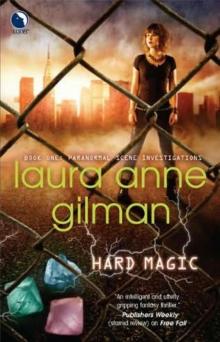 Hard Magic psi-1
Hard Magic psi-1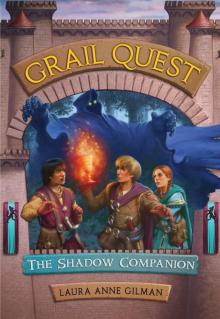 The Shadow Companion
The Shadow Companion Flesh and Fire
Flesh and Fire